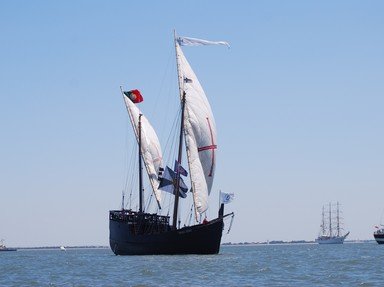Quiz Answer Key and Fun Facts
1. King Arthur was a good king, but his kingdom had problems. There was a drought, crops and livestock were dying, and not a drop of rain in the sky. He consulted with experts, but still could not find the real reason behind all of these problems.
2. King Arthur said: "We must go on a quest!" with the goal being to find out what is behind the problems in the kingdom. However, he forgot to tell Guinevere, his wife. Oh boy, was she ever mad. He was so in trouble that the king had to sleep on the sofa that night.
3. Not only was Guinevere mad at King Arthur, but, when he looked in the treasury, the vault was bare! How could he deal with the kingdom when the problems kept piling up at home?!
4. King Arthur needed funds, so he went to his richest knight, Sir Galahad. He told him all about the mission, but swore him to the utmost secrecy so that there would not be panic in the kingdom, fuelled by rumours.
5. Thankfully, Sir Galahad had some spare gold in his vault.
"I always keep some for a rainy day" he explained.
King Arthur thanked him for his generous donation, and the two set out to gather a trusted few that would go out with them on their quest.
6. King Arthur's knights hired a ship and set sail for their destination. As they were in their caravel, Sir Bors came up to King Arthur and told him:
"Milord, there is a ship approaching!"
"Do we have any reason to worry?" asked the king.
"Yes, my liege, I can see their banner, they're... they're.. PIRATES!"
7. When the pirate ship came close enough, people from both sides jumped to engage in battle. Eventually King Arthur found himself face-to-face with the pirate captain. Gripping his sword, Excalibur, tightly, Arthur launched into a vicious attack, eventually slicing right through the midsection of the pirate captain.
As the knights cheered, the pirates surrendered, and the knights continued on their quest.
8. As the knights reached their destination, they disembarked from their ship. They began to explore the new land they were on. King Arthur saw a dromedary and remarked "what strange animals be these... I'd much rather go back home!"
The other knights agreed, but did not want to give up just yet.
9. Suddenly, the adventurers came across an old mage. He told them that the answer to their problems was in a vial, which he gave them willingly, but warned them that they had to open it only when they were back in England.
The group returned home and went to open the vial, but discovered that the seal had been cracked long ago.
"Ah well", said Arthur, "that was all too easy for it to actually be the solution".
10. Disappointed, Arthur went out to the fields to contemplate the situation. Guinevere went out to meet him and offered him some advice:
"Why don't you look to the skies?" she asked.
"You mean, pray to God?" was the confused reply. "Don't you think I've tried that?!"
"No, you dolt, just look!"
When Arthur actually raised his eyes, suddenly he saw it. Clouds! A storm! Rain! England was going to be fine, after all!
Source: Author
LeoDaVinci
This quiz was reviewed by FunTrivia editor
Fifiona81 before going online.
Any errors found in FunTrivia content are routinely corrected through our feedback system.
